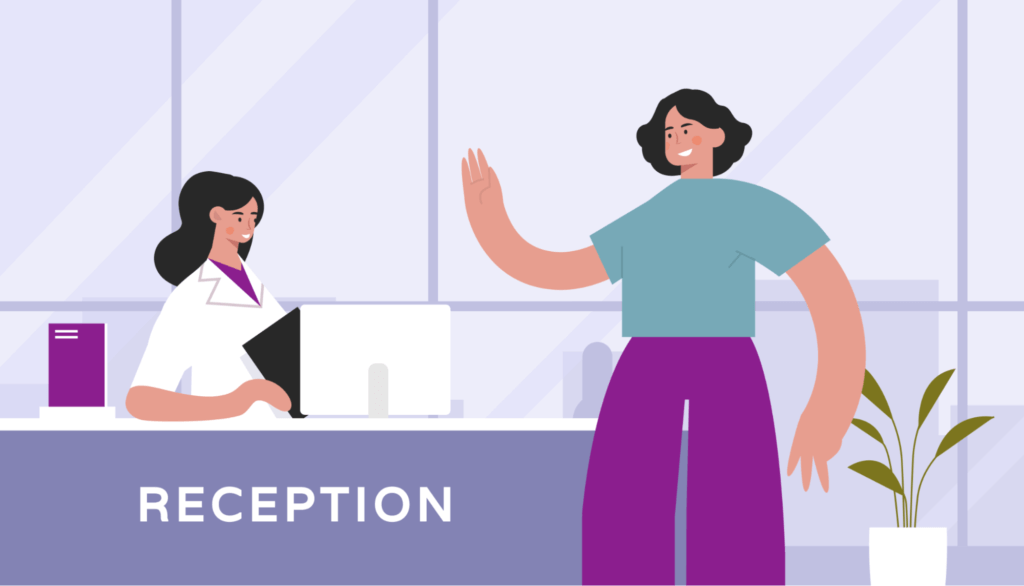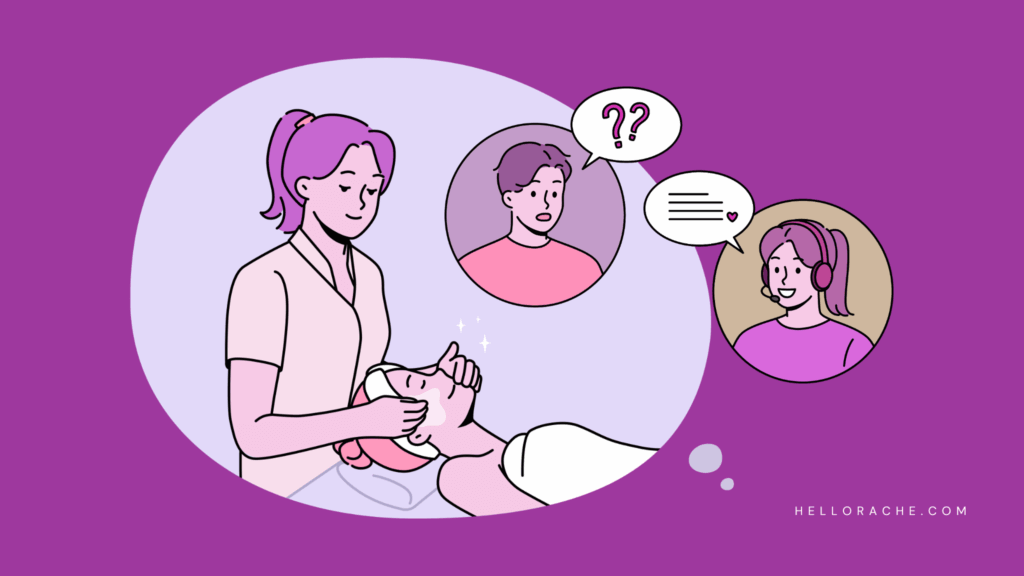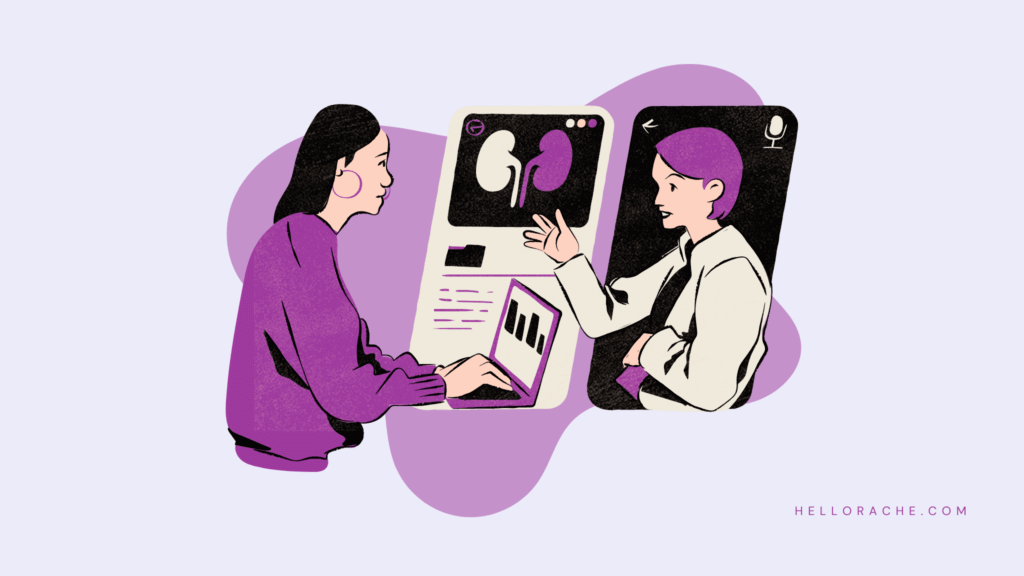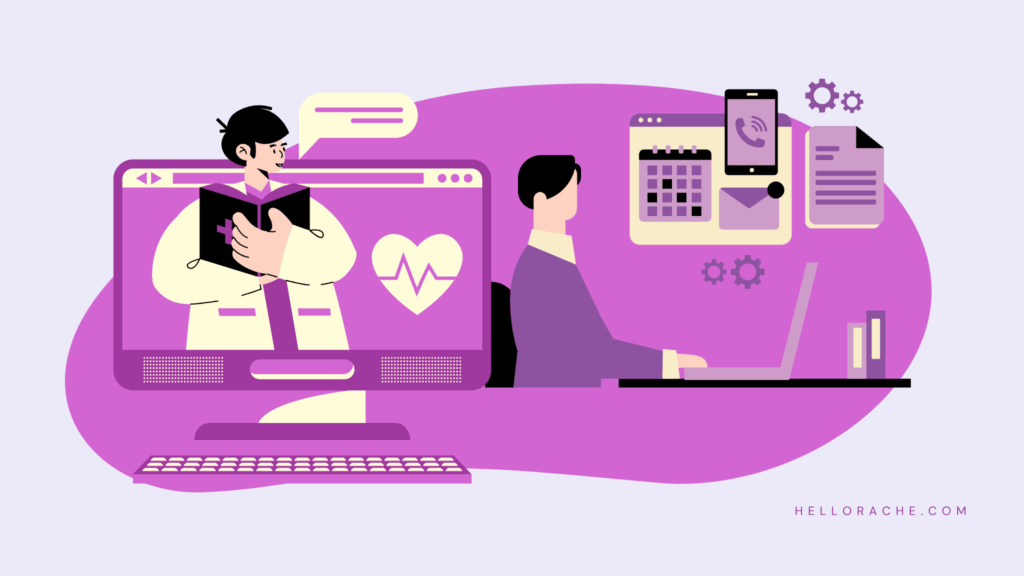When patients first walk into your clinic, the first person they’ll see and speak to is your receptionist. That’s why who you hire as a clinical receptionist can have a huge impact on your practice.
The right individual or team of clinical receptionists can make an entire clinic run smoothly and serve patients with care. However, talented clinical receptionists are difficult to find and expensive to hire.
If you’ve decided to hire one or more clinical receptionists, what skills should you look for first? Is an in-person clinical receptionist the best solution for your practice? Keep reading to find out.
What is a clinical receptionist?
Clinical receptionists represent your clinic in a patient-facing role — usually in the reception area. They’re the main point of contact for patients who enter your clinic or contact the clinic via phone or email.
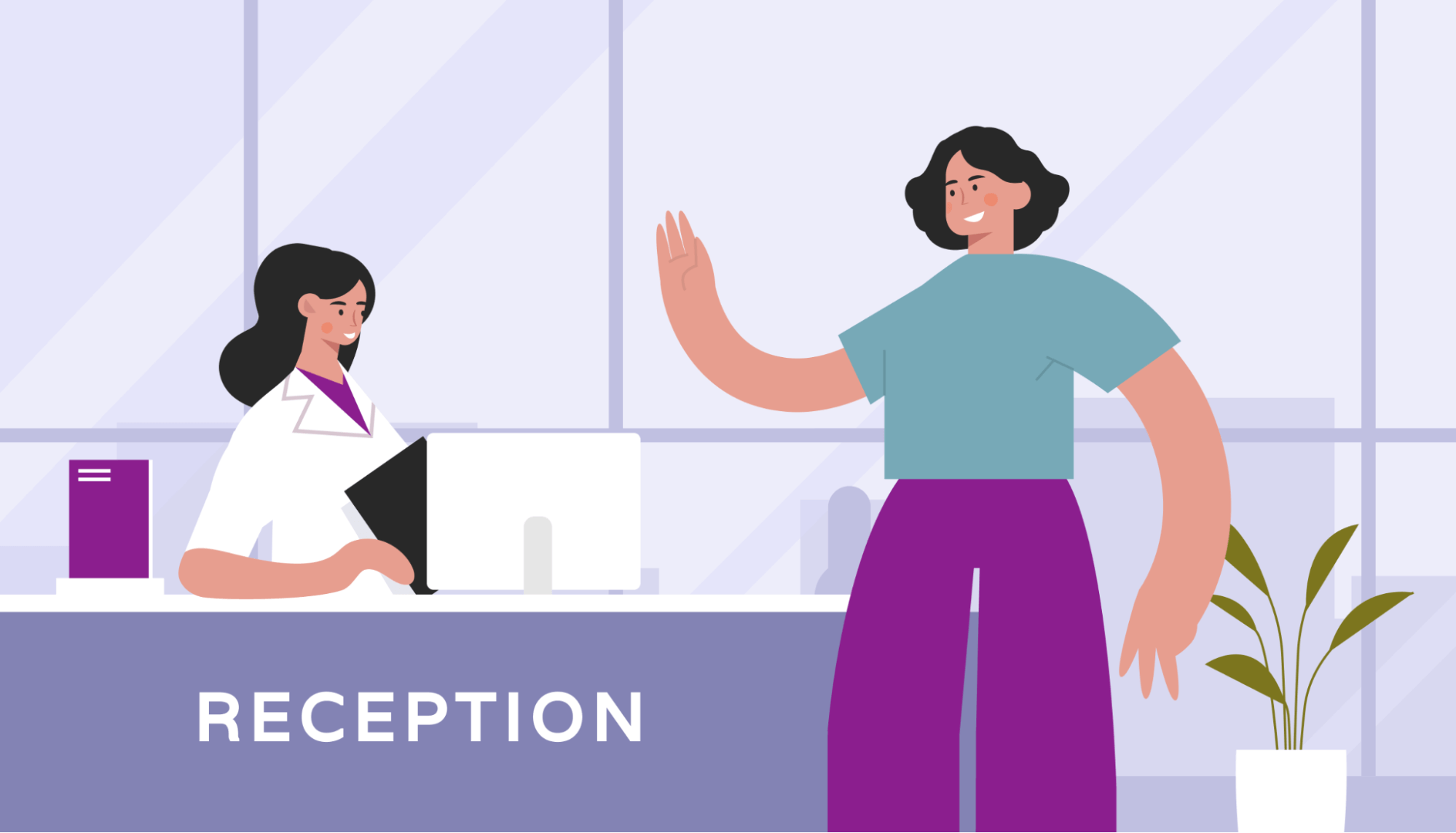
Receptionists in a clinic answer patient inquiries and handle appointment-setting and rescheduling.
At Hello Rache, we can match you with a fully trained virtual clinical receptionist who can handle all of these tasks and more. Book a consultation with us to learn more.
What does a clinical receptionist do?
Clinical receptionists greet patients who enter your practice in a friendly and cordial way. They also update patient records and keep all documents filed and organized.
Plus, they’re responsible for preparing any important documentation on patients and planning a daily schedule for you or your staff.
Whenever patients require assistance filling out forms, a clinical receptionist can step in to help and guide them. They’ll also communicate with insurance providers and process payments for all services incurred at the clinic.
If there’s follow-up required with patients, including appointment reminders and cancellations, clinical receptionists usually handle these tasks. They’ll also perform any other administrative duties required in your clinic.
What makes a good clinical receptionist?
Keep in mind that clinical receptionists aren’t just administrative assistants. They’re the public face of your clinic. That’s why you should look for someone who can do more than just file paperwork.
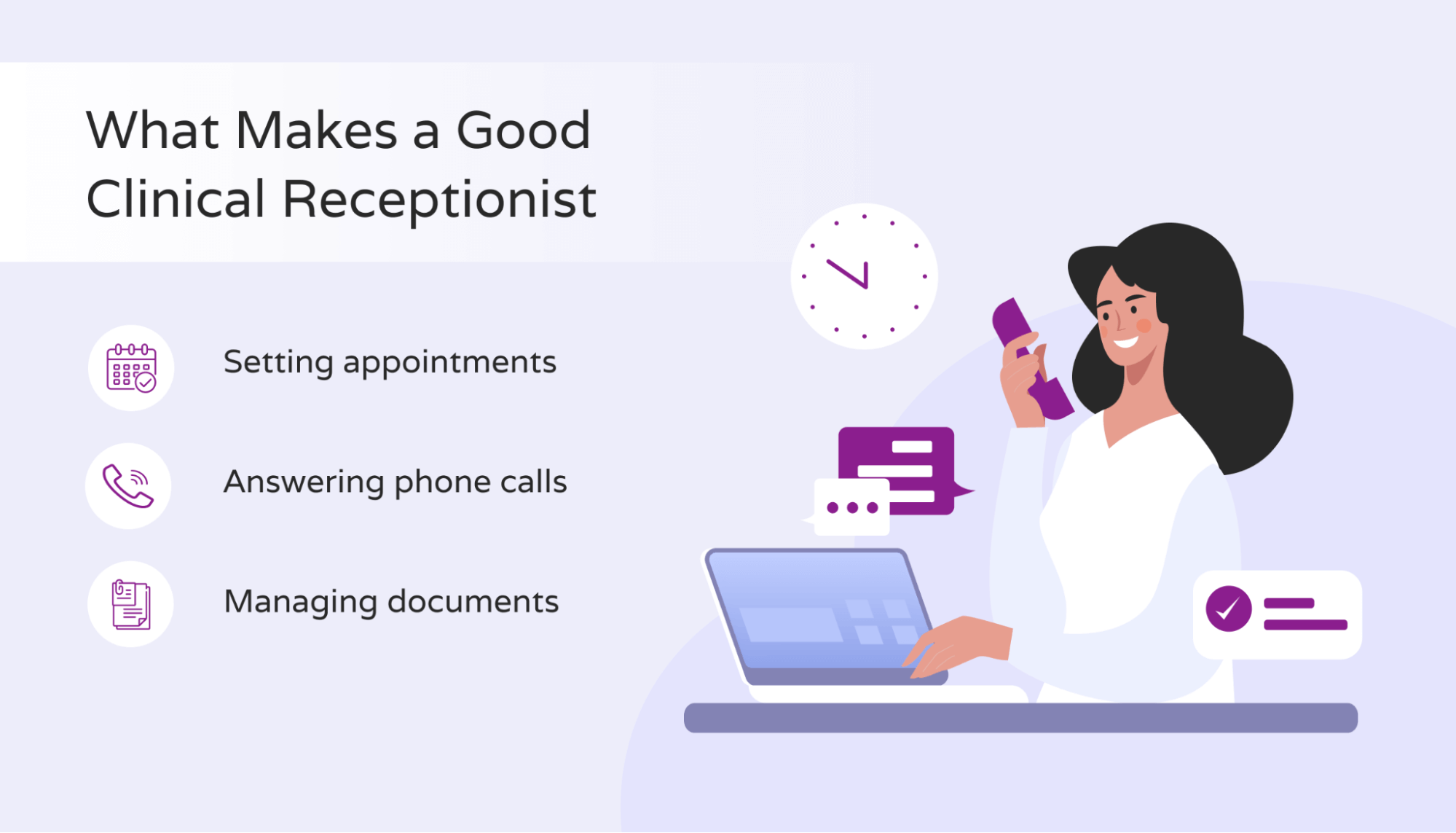
Here’s what to look for in a great clinical receptionist for your healthcare practice.
1. HIPAA compliance training
HIPAA compliance training is an important pillar for any person working in a healthcare setting. Whenever someone has access to your patients’ information, they’ll need to be trained in HIPAA compliance.
It can take a long time to properly train someone who has no experience with HIPAA compliance. On the other hand, you won’t need to train your clinical receptionist if you find someone who already has this training under their belt.
While you don’t need to find someone with this training, it’ll make the onboarding process much faster and smoother if they already have the required training.
2. Strong computer skills
You need someone reliable with strong computer skills to handle your reception area. The ideal clinical receptionist can operate your reception’s systems with ease. Or, they should at least have the learning capacity to adapt and learn about new systems quickly.
But receptionists in a clinical setting need more than simple computer skills. They also need to be comfortable with EMR systems. Without an EMR system, you’ll need to rely on a serious amount of paperwork, which takes up space and isn’t as easily accessible as electronic documentation.
A clinical receptionist will also need to be comfortable with other software that’s required to answer calls, respond to emails, create and update patient files, and anything else that’s needed to run the reception area smoothly.
3. Exceptional organizational skills
Healthcare clinics have a lot of documents, patients, appointments, and more to manage. Someone who’s not on top of their game when it comes to organizational skills will quickly get overwhelmed.
Your clinical receptionist shouldn’t just be “good” at staying organized — they need to be meticulous. That’s especially true if you want to grow over time.
If you ever want to expand your clinic and grow your clientele, it’s important to onboard a clinical receptionist who can adapt to these changes. So, not only should they have exceptional organizational skills, but they should be proactive and flexible.
4. Friendly and helpful attitude
Unfortunately, not all patients in a healthcare clinic will be friendly and patient. The opposite can be true since many of them will be frustrated, in pain, or grieving.
Since most patients won’t be in the best mood, they can often be difficult to deal with.
A talented clinical receptionist can approach any patient with compassion and a helpful attitude. They’re able to interact with patients in a diplomatic way and understand that they shouldn’t take it personally if a patient is rude.
That doesn’t mean your clinical receptionist should let patients walk all over them. However, they need to treat patients with care, respect, and empathy.
5. Comfortable with clinical terminology
Finally, a clinical receptionist should have some level of comfort with your clinical terminology.
Whether you have a dental, vet, or medical clinic, you probably use specific terminology that the general public doesn’t understand. The best clinical receptionists are already familiar with most of the terms your physicians and nurses use on a daily basis.
You can also hire someone who doesn’t understand this terminology yet. However, you’ll need to account for additional training time before your receptionist is ready to work on their own. While someone who’s already comfortable with clinical terminology can get started much faster and start delivering value from day one.
How much does it cost to hire a clinical receptionist?
So you’ve decided you want to onboard a new clinical receptionist. But how much should you expect to spend?
The first number to account for is your clinical receptionist’s salary. According to the Bureau of Labor Statistics, the average wage for receptionists in a healthcare setting is $19.11 per hour in the US. That’s equivalent to $39,740 per year for a full-time clinical receptionist.
However, you may need to offer a higher salary to attract talented workers. This will depend on the workforce in your local area. While some areas have plenty of talented workers available, others may experience a shortage of talent.
Plus, you need to account for much more than salary alone. For instance, there are overhead costs associated with an in-person clinical receptionist. You’ll need to pay for computers, phones, and office space required for a reception area. Your clinical receptionist will also need a desk, a suitable chair, and other equipment.
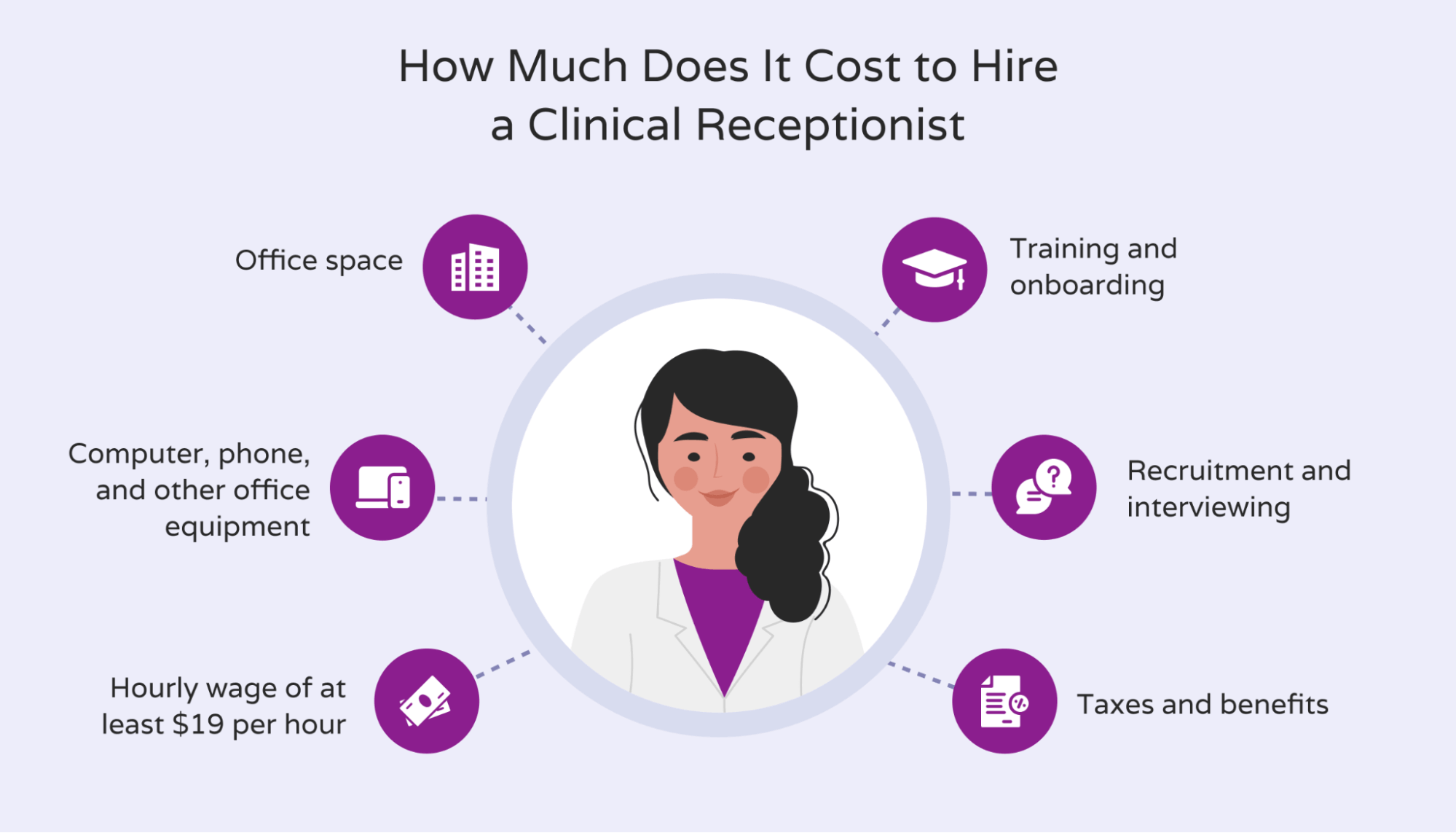
But that’s not all. You need to factor in the cost of employment taxes and benefits. The specifics will vary depending on the size of your clinic and which state you’re located in.
Recruiting a clinical receptionist is also an expensive endeavor. Not only do you need to factor in the time it takes to put up job listings and sift through them, but you’ll also need to run background checks on potential candidates.
You’ll also need to interview candidates — and when you’re in a job interview, you can’t see patients. This results in lost revenue during the recruitment process.
Finally, you’ll need to train and onboard your new clinical receptionist. Your candidate will require additional training in HIPAA compliance and clinical terms if you can’t find someone who already has these qualifications.
And if you find someone with every qualification you need, you’ll likely have to pay more to attract and retain them.
How a virtual clinical receptionist can help your practice
If you need an extra set of helping hands for your clinic’s reception, you no longer have to hire someone in-person. Instead, consider hiring a virtual healthcare receptionist.
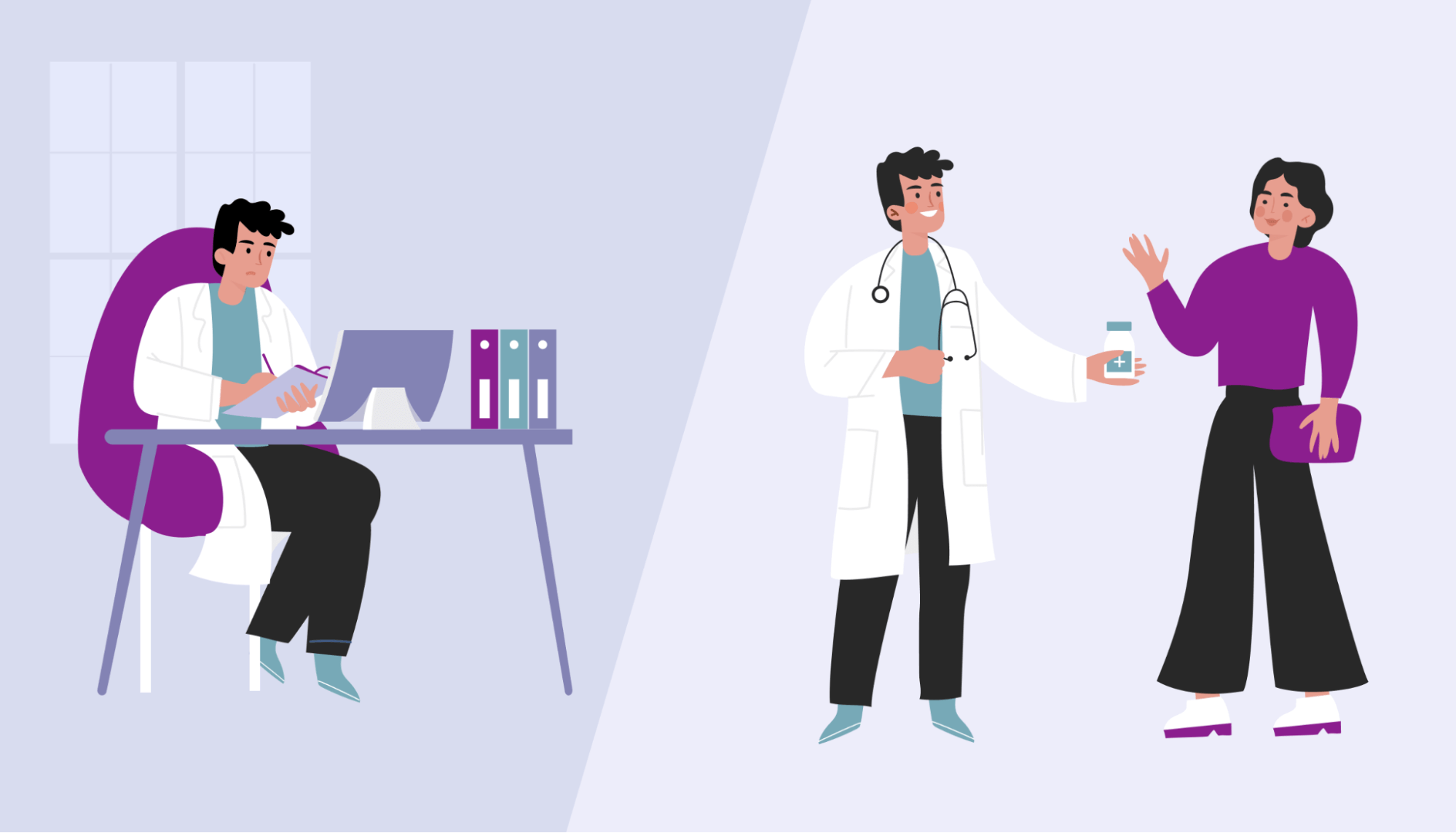
Here’s how a virtual receptionist can help your clinic compared to hiring an in-person receptionist.
1. Save time on office tasks
A virtual medical receptionist can remove the burden of repetitive administrative tasks on you and your in-house staff. By removing the overload of tasks, your clinical receptionist can even improve the workflow of your entire clinic — all without taking up extra space in the office.
With a virtual receptionist on your team, your in-house staff can focus on revenue-generating tasks and stay in their zone of genius. They don’t need to worry about getting weighed down by repetitive tasks they weren’t specially trained for.
2. Get a discount on your clinical receptionist's salary
If clinical receptionists weren’t so expensive, every clinic would have an army of them to support their patients. But in reality, clinic owners often have to choose between staying late to catch up on administrative tasks or eating into their profit margins.
But a virtual clinical receptionist can be a lot more affordable than an in-person receptionist. That’s because virtual clinical receptionists can work from anywhere, so you don’t need to hire ones that live in a high-cost area. For example, our virtual clinical receptionists are all trained medical professionals outsourced from the Philippines.
While the cost of living is high in the United States, everything is much more affordable in the Philippines. And because the cost of living is lower, you can pay $9.50 per hour for a talented and highly trained clinical receptionist who’s comfortable in a medical setting.
3. Save on training and onboarding
If you’re overwhelmed by the thought of going through the recruitment and onboarding process, don’t worry.
Virtual clinical receptionists don’t require additional medical training to work in a clinic. They’re already HIPAA compliant and usually have direct experience in a healthcare setting. Many of them at Hello Rache are registered nurses (and if not, they have a different medical background).
Your receptionist is useful from day one because they’re already trained in the skills your clinic needs. Plus, that also means you can skip the entire recruitment process.
You don’t have to:
- Come up with detailed job postings
- Sift through hundreds of applications
- Interview dozens of candidates
- Deal with candidates who don’t respond
- Negotiate with your chosen candidate
- Onboard and train your chosen candidate
You can simply tell the Hello Rache team what you’re looking for in a clinical receptionist, and you’ll get paired with the ideal candidate for your medical, dental, or veterinary clinic. You can even interview a candidate in as little as one or two days.
4. Serve your patients better
All virtual clinical receptionists are closely monitored while on the job. They’re also routinely evaluated to ensure they continually provide the best service possible.
With a talented virtual clinical receptionist on your team, you can serve your patients better. Your virtual assistant can support your existing staff to answer all patients promptly and make sure everyone has what they need.
And with better service, you can retain your patients for longer and attract new patients through word of mouth.
According to Salesforce, 78% of consumers will still return to a business after that business makes a mistake if they have excellent customer service. Additionally, 83% of consumers expect to speak to someone immediately when they contact a company. Virtual clinical receptionists solve both of these issues.
5. Avoid overhead costs
A virtual clinical receptionist takes up less space than an in-person receptionist. This means you can easily expand your reception’s capacity without paying for:
- A larger space
- New desks
- A new high-end computer
- Miscellaneous office equipment
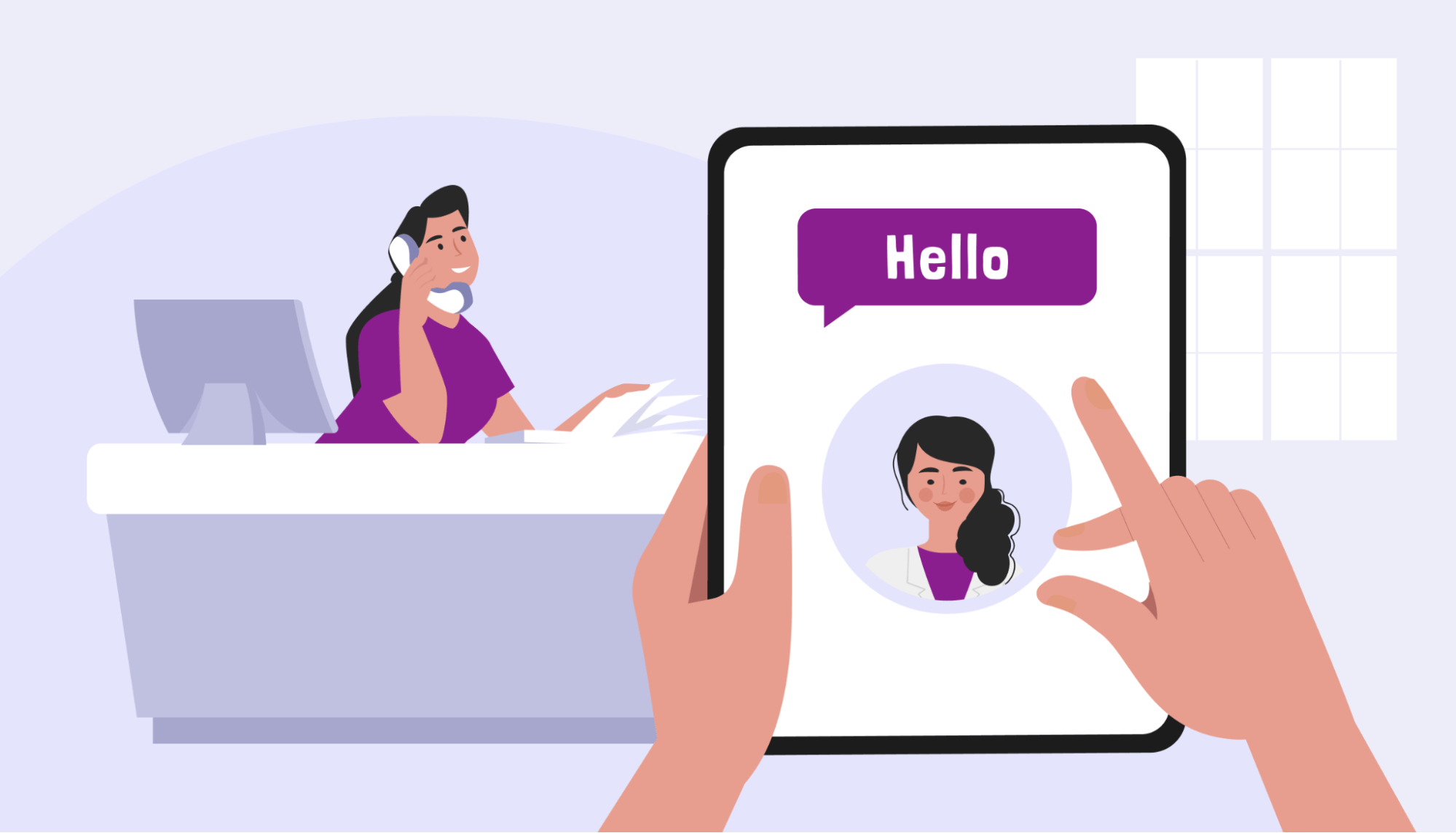
Instead, you can dedicate a small space in your existing reception area for your new virtual receptionist. All you need is a tablet to allow your virtual receptionist to speak to patients and a payment process to allow patients to pay you for your services. You achieve this setup with or without an in-person clinical receptionist.
Since you need less space in your reception area, you can dedicate a bigger area for seating. Your patients will be more comfortable while still getting the service they deserve.
Hire a talented virtual clinical receptionist
If your practice is growing and you're seeing an influx in patients, it’s impossible to keep the show running on your own, but it’s often hard to justify hiring a full-time clinical receptionist because of the high payroll costs. Going virtual is the answer.
With the right virtual clinical receptionist in place, you can improve your clinic's workflow while cutting costs and providing high-quality care to all your patients. Book a call with us, and we’ll help you find the perfect clinical receptionist for your clinic’s needs.

